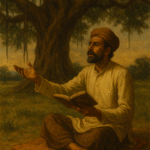Nelson Mandela: The Storyteller of Freedom
Nelson Mandela Beyond the Icon
Nelson Mandela is often remembered as the face of resistance and reconciliation in South Africa. But beyond the speeches and the political legacy, there lies a quieter, enduring truth—Mandela was also a writer. His relationship with literature was not just intellectual; it was deeply emotional and political. Books were his companions in prison, and writing became his tool for survival, reflection, and transformation.
Reading Behind Bars: The Prison as a Library
During the 27 years Mandela spent in prison, particularly on Robben Island, books became lifelines. He once said, “The reading of books nourished me.” This nourishment was not only of the mind but also of the spirit. With limited resources, he created a space where literature became resistance. He read widely—from African history to European classics—and often shared books with fellow inmates. The prison, in a way, turned into an underground university.
Long Walk to Freedom: A Political Memoir Rooted in Literature
Mandela’s autobiography, Long Walk to Freedom, stands as one of the most influential political memoirs of the 20th century. Written in secrecy and smuggled out in parts, the book reflects not only the struggle against apartheid but also Mandela’s love for the written word. His voice in the memoir is honest, measured, and often poetic. Rather than anger, the book radiates patience and hope. That’s the power of literature—it softens the edges of pain.
Writing as Resistance: The Pen and the Protest
Mandela believed in the power of language to reshape society. In letters, speeches, and essays, he chose words carefully. Even under extreme repression, his writing carried clarity, strength, and dignity. He used storytelling to humanize the struggle, to show that behind every injustice, there were people—families, dreams, futures. His writing wasn’t just about documenting events; it was about reclaiming a voice in a country that tried to silence millions.
The Influence of African and World Literature on Mandela
Mandela’s reading list wasn’t narrow. He engaged with authors like Chinua Achebe, Leo Tolstoy, and Shakespeare. In fact, Mandela was particularly moved by Julius Caesar, and passages from the play circulated secretly among prisoners. He believed that literature from around the world, especially those rooted in moral courage, spoke to the heart of South Africa’s freedom struggle. The interconnectedness of global voices reinforced his belief in shared humanity.
Legacy in Letters: Mandela’s Continued Impact on Readers
Today, Nelson Mandela continues to inspire readers across the globe. His books, letters, and speeches are included in classrooms, quoted in movements, and printed on banners. Young people find in his writings a model of ethical leadership and calm resolve. Mandela teaches us that to read is to think, and to write is to act.
Conclusion: Nelson Mandela’s Literary Resistance Lives On
Nelson Mandela used the page like others use the streets—for protest, for memory, for hope. His relationship with literature was as vital as his political activism. On his birth anniversary, we remember not just the president or the prisoner, but the man who believed in the power of words to build a more just world.
Suggested Reads
- Nelson Mandela Foundation
- Long Walk to Freedom – Goodreads
- Robben Island Museum
- UN Nelson Mandela International Day
- Letters from Nelson Mandela – Book Review
Also Read on BlogOpine
Appacha Kavi and the Poetry of Resistance: Defending Kodava Identity Through Song


